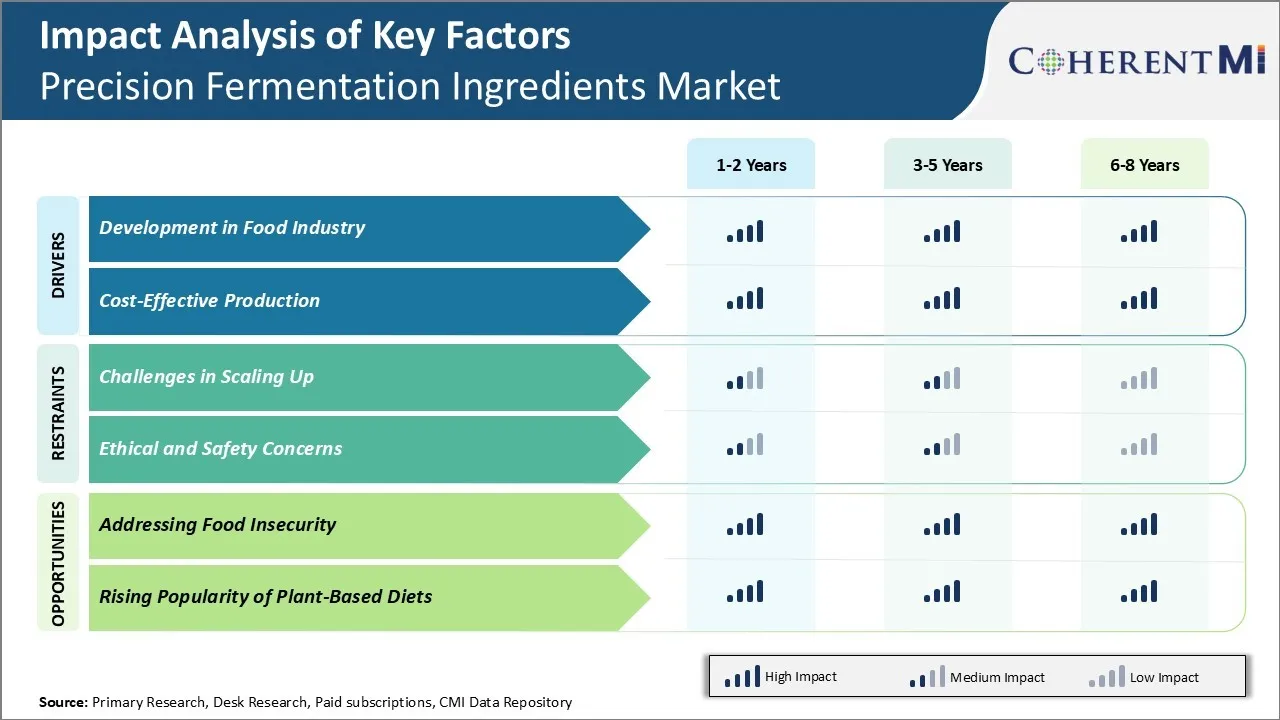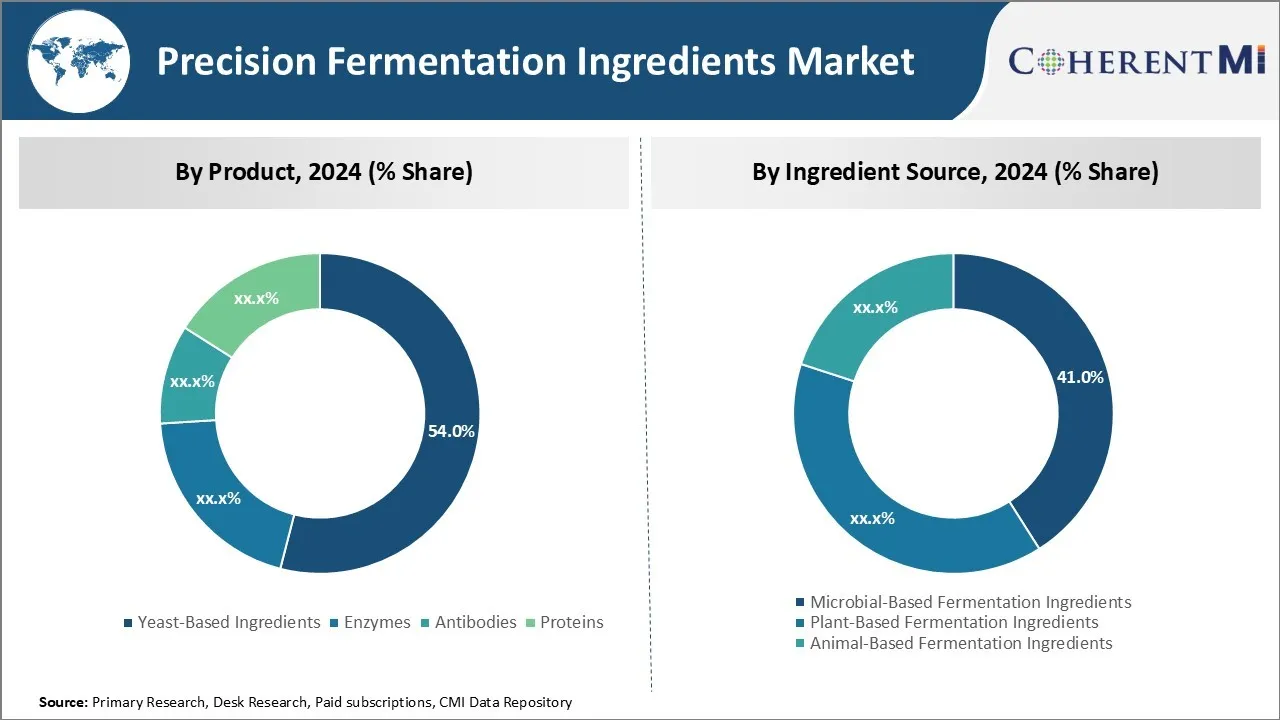Precision Fermentation Ingredients Market SIZE AND SHARE ANALYSIS - GROWTH TRENDS AND FORECASTS (2024 - 2031)
Precision Fermentation Ingredients Market is segmented By Product (Yeast-Based Ingredients, Enzymes, Antibodies, Proteins), By Ingredient Source (Micr....
Precision Fermentation Ingredients Market Size
Market Size in USD Bn
CAGR43.5%
| Study Period | 2024 - 2031 |
| Base Year of Estimation | 2023 |
| CAGR | 43.5% |
| Market Concentration | Medium |
| Major Players | Perfect Day Inc., Motif Foodworks, Impossible Foods Inc., The EVERY Company (Clara Foods), Novozymes A/S and Among Others. |
please let us know !
Precision Fermentation Ingredients Market Analysis
The precision fermentation ingredients market is estimated to be valued at USD 4.65 Bn in 2024 and is expected to reach USD 58.3 Bn by 2031. It is expected to grow at a compound annual growth rate (CAGR) of 43.5% from 2024 to 2031. The precision fermentation ingredients market is witnessing growth with increasing popularity as it provides plant-based and more sustainable alternatives to conventional foods such as dairy and meat.
Precision Fermentation Ingredients Market Trends
Market Driver - Development in Food Industry
The food industry has shown unprecedented growth and development over the last few decades. Consumer demands and preferences have evolved significantly giving rise to newer product categories and innovation. There is a strong focus on producing food that is not only tasty and tempting but also healthy, nutritious and produced in a sustainable manner.
Through precision fermentation, companies can develop ingredients that are clean-label and free from allergens like dairy, eggs and soy which are preferred by health-conscious consumers. This is proving instrumental in developing the next generation of foods like plant-based meats and dairy products that can match animal-based foods in taste and nutrition.
Sustainability is another focus area for food companies nowadays with mounting pressure from regulations as well as environmental advocacy. Precision fermentation provides a means to produce diverse ingredients more sustainably without relying on agricultural resources. Producing native and exotic fruits without seasons allows year-round availability of such nutritive foods. Further, less dependency on commodities prone to pricing volatility ensures input cost stability for food companies.
Market Driver - Cost-effective Production
One of the major drivers for the growth of precision fermentation based ingredients has been their cost-effectiveness over traditional production methods. Setting up fermentation infrastructure has relatively lower capital expenditure and shorter lead times than building new farms or fisheries. Once established, the fixed costs are also spread over large production volumes resulting in cheaper per unit costs. Precision fermentation ingredients provide scaled-up, centralized production of ingredients throughout the year without depending on unpredictable agricultural seasons and weather conditions.
Further, continuous fermentation processes allow utilizing fermenters 24/7 thereby maximizing asset utilization for higher overall equipment effectiveness. Tailoring the fermentation conditions also ensures higher product yields with less wastage.
The operational costs are also way more optimized compared to livestock farming or aquaculture. Fermentation eliminates the costs involved in feeding, housing, treatment and transportation of animals. It also does away with requirements for large tractor operations, cold storage warehousing for agricultural produce.
Overall, precision fermentation ingredients emerge as a highly efficient production method delivering cost competitiveness across the value chain over conventional options. This makes such innovative ingredients more accessible to food companies and consumers.

Market Challenge - Challenges in Scaling Up
One of the major challenges faced by the precision fermentation ingredients market is scaling up production to meet growing commercial demands. Scaling operations up to an industrial level poses certain technical hurdles for players in the precision fermentation ingredients market. Producing high volumes of ingredients requires large fermentation vessels that can support high biomass densities. Ensuring uniform growth of microbes across such large volumes without compromising product quality is a challenge.
Precisely controlling fermentation conditions such as temperature, pH, oxygen levels at an industrial scale also becomes difficult. Maintaining sterility over multiple large vessels poses biosecurity risks. Product downstream processing such as harvesting, extraction and purification also needs to scale up significantly to handle commercial-scale volumes.
Transitioning from a small pilot to full commercial production requires meticulous planning and testing to minimize risks of failure during the scale-up process. Overcoming these challenges in a cost-effective manner is critical for the industry to realize the widespread benefits of precision fermentation ingredients.
Market Opportunity - Addressing Food Insecurity
One of the major opportunities for precision fermentation ingredients market lies in addressing the problem of global food insecurity. With the world population expected to reach nearly 10 billion by 2050, there is a pressing need to sustainably meet the rising food demand. However, constraints in agricultural land, water and other natural resources threaten our ability to do so through traditional farming means.
Precision fermentation techniques provide a viable solution by producing various food ingredients like protein, dairy and plant-based alternatives in a highly efficient and environmentally sustainable manner without relying majorly on agricultural land. This could help supplement the global food supply and aid in feed more people.
By offering scalable production of affordable and nutritious ingredients, precision fermentation has strong potential to help alleviate food shortages, lower malnutrition rates and address the challenge of food insecurity around the world especially in developing regions. As addressing food security rises up the global agenda, precision fermentation ingredients is well-positioned to play an important role.
Key winning strategies adopted by key players of Precision Fermentation Ingredients Market
Precision Bio invested $75 million in 2021 to scale up its production of precision fermentation ingredients such as collagen and keratin using microbial fermentation. This large funding allowed them to significantly expand production capacity to meet growing demand.
Perfect Day adopted an open-source business model where they share their microbial strains and fermentation methods with other companies for a small licensing fee. This allowed their technology to scale much more rapidly as other producers were able to adopt their platform.
Geltor pursued a product differentiation strategy by focusing on precision fermentation ingredients that are difficult to produce through traditional methods, like recombinant collagen. They launched their first product, vegan collagen, in 2017 to address a nearly $600 million market for collagen Beauty supplements.
Segmental Analysis of Precision Fermentation Ingredients Market

Insights, By Product: Versatility drives demand for Yeast-Based Ingredients
In terms of product, yeast-based precision fermentation ingredients contributes 54% share of the precision fermentation ingredients market in 2024. This is owning to its versatile applications across multiple industries. Yeast extracts offer an umami taste and savory flavors that are widely used in processed foods to enhance and supplement the natural flavors. They are commonly found in soups, sauces, dressings, and frozen meals to boost savoriness without adding salt or MSG.
Yeast is also a primary ingredient in the production of beer, wine and other fermented beverages. As consumption of alcoholic beverages continues to rise globally, particularly in developing nations, the demand for yeast remains robust. Additionally, yeast derivatives find numerous uses in the pharmaceutical sector for vaccines, antibiotics, and other medicine.
The health benefits of probiotic yeast strains are attracting more consumers, thereby expanding market opportunities. Versatility remains the biggest strength for yeast-based ingredients as they fulfill the taste, texture, and nutritional requirements across multiple end use industries.
Insights, By Ingredient Source: Specialized Needs Fuel Microbial-based Fermentation Ingredients Demand
In terms of ingredient source, microbial-based precision fermentation ingredients contributes 41% share of the precision fermentation ingredients market in 2024 owing to its adaptability in producing complex molecules. Microbes like yeast and bacteria are regularly manipulated through genetic engineering and fermentation techniques to synthesize targeted compounds. This provides solutions for specialized ingredient demands that plant and animal sources cannot fulfill.
Similarly, microbial fermentation has enabled large-scale, economical production of antibodies, proteins and other biologics for biopharmaceutical purposes. These molecules aid drug discovery, diagnostics, and treatment of critical diseases. As R&D intensifies in sectors like healthcare, biologics and specialty chemicals, demand for tailor-made microbial-derived ingredients is witnessing strong momentum. Their genetically programed precision sets microbial-based precision fermentation ingredients apart from other ingredient sources.
Insights, By Application: Convenience and Nutrition Drive Food & Beverages Demand
In terms of application, food & beverages contributes the highest share of precision fermentation ingredients market owing to changing consumer preferences for convenience and nutrition. Precision fermented ingredients allow manufacturers to develop value-added packaged foods with clean label claims free of artificial preservatives, sweeteners, colors or MSG. Products incorporating yeast extracts, microbial enzymes and probiotic cultures benefit from longer shelf-life and stable organoleptic properties.
Precision fermented ingredients such as proteins and antibodies are gaining importance as non-GMO, plant-based alternatives to whey and casein in foods, drinks and supplements. As consumers pay more attention to ingredient sources and nutritional benefits, food brands are turning to precision fermentation ingredients. Rapid growth of health-conscious and vegetarian demographic further stimulates demand through this segment.
Additional Insights of Precision Fermentation Ingredients Market
- North America: Dominated the precision fermentation ingredients market with the largest share of 37% in 2023.
- Asia Pacific: Fastest-growing region, driven by the demand for plant-based protein alternatives.
- The yeast-based ingredients segment held a major share in precision fermentation ingredients market of 54% in 2023.
- The proteins segment is expected to be the fastest-growing segment in the precision fermentation ingredients market.
- North America accounted for the largest market share, and the U.S. is the largest contributor to precision fermentation ingredients market, estimated at USD 840 million in 2023.
Competitive overview of Precision Fermentation Ingredients Market
The major players operating in the precision fermentation ingredients market include Perfect Day Inc., Motif Foodworks, Impossible Foods Inc., The EVERY Company (Clara Foods), Novozymes A/S, Amyris, Inc., BlueNalu, Inc., Brightseed Inc., Biomilq, Bolt Threads Inc., Enzymaster (Bio-Engineering Co., Ltd.), and KnipBio.
Precision Fermentation Ingredients Market Leaders
- Perfect Day Inc.
- Motif Foodworks
- Impossible Foods Inc.
- The EVERY Company (Clara Foods)
- Novozymes A/S
Precision Fermentation Ingredients Market - Competitive Rivalry, 2024

Precision Fermentation Ingredients Market
(Dominated by major players)
(Highly competitive with lots of players.)
Recent Developments in Precision Fermentation Ingredients Market
- In February 2024, Unilever launched lactose-free ice cream using precision fermentation technology, in collaboration with Perfect Day. This marks the first product by Unilever using precision fermentation ingredients, catering to the growing demand for lactose-free and vegan ice cream options.
Precision Fermentation Ingredients Market Segmentation
- By Product
- Yeast-Based Ingredients
- Enzymes
- Antibodies
- Proteins
- By Ingredient Source
- Microbial-Based Fermentation Ingredients
- Plant-Based Fermentation Ingredients
- Animal-Based Fermentation Ingredients
- By Application
- Food & Beverages
- Pharmaceuticals
- Agriculture
- Industrial Applications

Would you like to explore the option of buying individual sections of this report?
Frequently Asked Questions :
How big is the Precision Fermentation Ingredients Market?
The Precision Fermentation Ingredients Market is estimated to be valued at USD 4.65 Bn in 2024 and is expected to reach USD 58.3 Bn by 2031.
What are the major factors driving the Precision Fermentation Ingredients Market growth?
The development in food industry and cost-effective production are the major factor driving the Precision Fermentation Ingredients Market.
Which is the leading Product in the Precision Fermentation Ingredients Market?
The leading Product segment is Yeast-Based Ingredients.
Which are the major players operating in the Precision Fermentation Ingredients Market?
Perfect Day Inc., Motif Foodworks, Impossible Foods Inc., The EVERY Company (Clara Foods), Novozymes A/S, Amyris, Inc., BlueNalu, Inc., Brightseed Inc., Biomilq, Bolt Threads Inc., Enzymaster (Bio-Engineering Co., Ltd.), KnipBio are the major players.
What will be the CAGR of the Precision Fermentation Ingredients Market?
The CAGR of the Precision Fermentation Ingredients Market is projected to be 43.5% from 2024-2031.
What are the key factors hampering the growth of the Precision Fermentation Ingredients Market?
The challenges in scaling up and ethical and safety concerns are the major factor hampering the growth of the Precision Fermentation Ingredients Market.